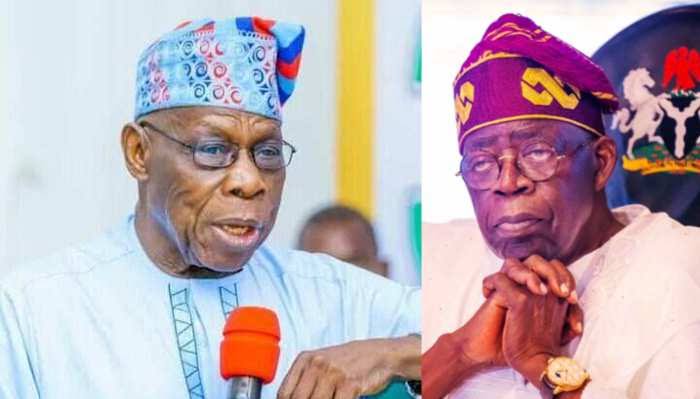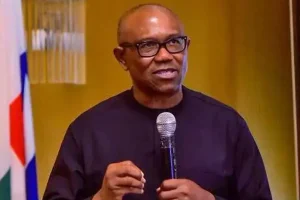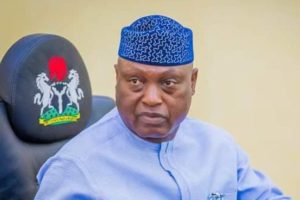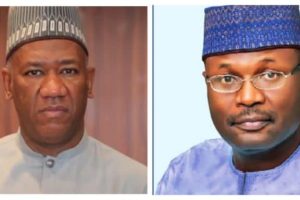
Former Nigerian President Olusegun Obasanjo has expressed deep concern over the troubling state of Nigeria’s economy, attributing much of the country’s struggles to a lack of accountability and effective leadership among current officials.
Speaking at the Chinua Achebe Leadership Forum, held at Yale University in New Haven, Connecticut, Obasanjo delivered a keynote address on the challenges facing Nigeria, titled, “Leadership Failure and State Capture in Nigeria.”
During his speech, Obasanjo highlighted the grave economic situation in Nigeria, stating, “As the world can see and understand, Nigeria’s situation is very bad.” He emphasized that beyond economic indicators, the root problem lies in the country’s leadership, which he believes is not only unwilling to take responsibility but is also failing to set a constructive example for the population. He warned that without leadership accountability, the nation would continue to face serious issues, including widespread corruption, insecurity, and deep-seated socio-political divisions.
Using Singapore as a case in point, Obasanjo pointed out how a nation can progress when its leaders are attuned to the needs of the people. Singapore’s government has prioritized investments in education, healthcare, and welfare, continually adapting to meet the evolving needs of its citizens. Obasanjo contrasted this with Nigeria’s situation, lamenting that the nation’s leaders have been slow to respond to similar needs.
Obasanjo didn’t mince words when describing the current state of Nigeria. He said, “The more corruption and immorality take hold, the more the nation spirals into chaos, insecurity, division, depression, and even violence.” Reflecting on the rise of turmoil across the country, he attributed many of these issues to pervasive issues like mismanagement, injustice, and incompetence, noting that such problems have contributed to Nigeria’s growing status as a failing state.
In his speech, Obasanjo also quoted Chinua Achebe’s renowned work, “The Trouble with Nigeria,” asserting that, “The Nigerian problem is a clear failure of leadership.” He explained that the country’s political leaders have either been unwilling or unable to live up to the standards of responsible, inspiring leadership, which has hindered Nigeria’s progress.
The former president went on to mention two prominent American scholars, Robert Rotberg and John Campbell, who have previously warned about the consequences of Nigeria’s potential decline. Given Nigeria’s economic influence, population size, and strategic importance on the African continent, he argued that the impact of Nigeria’s failing state could ripple far beyond its borders.
In a further critique, Obasanjo identified “state capture” as one of the most damaging forms of corruption affecting Nigeria. He described it as a form of corruption where influential individuals and groups manipulate policies, regulations, and national resources for personal gain. He cautioned that this phenomenon, often fueled by powerful political and business alliances, distorts policies to serve private interests, compromising the public good.
Obasanjo elaborated that state capture isn’t always visible or explicit; sometimes it’s rooted in subtle alliances, where political and business elites align their interests through family ties, friendships, or shared economic assets. “We see this in Nigeria today,” he said, “where national assets are sold to elites and their associates at discounted rates, and resources like land and minerals are handed out to local and foreign actors.” This control over the state’s assets and resources, he argued, compromises Nigeria’s development and exploits the nation’s resources.
Public institutions, including the executive, legislative, and judicial branches, Obasanjo warned, are particularly vulnerable to this form of corruption. In Nigeria, state capture often takes place through political funding, vote-buying, lobbying, and backdoor appointments, he explained, which allow interest groups to gain undue influence over public policies.
Obasanjo closed his remarks by underscoring the danger of this system: when laws and regulations are created primarily to serve elite interests, the entire country suffers. Essential sectors such as public services, healthcare, education, and infrastructure, he argued, are undermined by policies that favor a select few at the expense of the public.
Reflecting on the path forward, Obasanjo expressed hope that Nigeria could still turn around its situation. However, he stressed that such a turnaround would require a dedicated push to root out state capture, restore integrity in governance, and foster leaders who are genuinely committed to serving the interests of all Nigerians.





